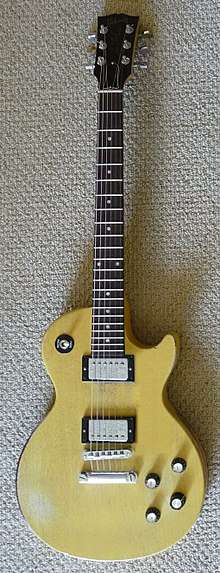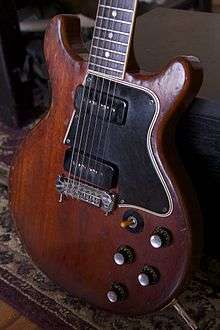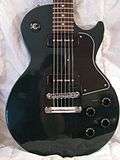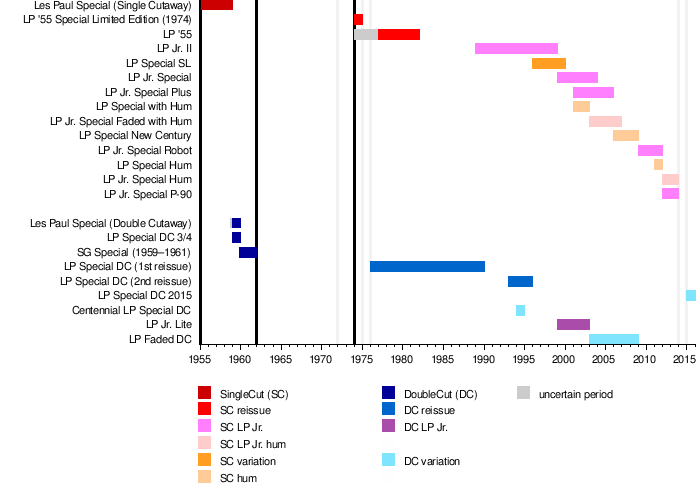Gibson Les Paul Special
The Gibson Les Paul Special is a variation of the Gibson Les Paul guitar. It was introduced in 1955.[1]
| Gibson Les Paul Special | |
|---|---|
 Les Paul Junior Special Faded With Humbucker | |
| Manufacturer | Gibson |
| Period | 1955–1959[1]
|
| Construction | |
| Body type | Solid |
| Neck joint | Set |
| Scale | 24.75" |
| Woods | |
| Body | Mahogany |
| Neck | Mahogany |
| Fretboard | Rosewood |
| Hardware | |
| Bridge | Wraparound / Tune-o-matic (reissue) |
| Pickup(s) | 2 Single-coil, P-90 |
| Colors available | |
| TV Yellow, White, Cherry Red | |
Overview
Like most of Gibson's other budget models, the Les Paul Special was produced in a TV Yellow finish, which was made by Gibson as a finish that would look good on black and white television. In 1958, the model received a major change when it was introduced as a doublecut model instead of the traditional singlecut.
In 1961, the Les Paul received a drastic change when it was formed into what we know today as the Gibson SG. Once Les Paul's contract had expired later that year, the Les Paul submodels changed with it. In 1968, when the contract was renewed, the original models were rebooted, and Gibson and Gibson Custom Shop now offer a total of four Les Paul special models: two single cut and two double cut.[7]
.jpg)

 Gibson Les Paul Special Singlecut in Spearmint (1998)
Gibson Les Paul Special Singlecut in Spearmint (1998)
Models
The list of Special models manufactured since 1955.[6]
Single Cutaway
- 1955–1958: Les Paul Special (Single Cutaway)
- 1974:[3][4] Les Paul '55 Special limited edition
- 1974[6]/1977[3]/(1978[5])–1981:
Les Paul '55 (Special Single Cutaway Reissue) - 1989–1998: Les Paul Junior II (Les Paul Special Single Cutaway Reissue)[8]
- variations
- 1996–1999: Les Paul Special SL (LPJS)
- 1999–2003: Les Paul Junior Special (LPJS)
- 2001–2005: Les Paul Junior Special Plus (LPJ+)
- 2001–2002: Les Paul Junior Special With Humbucker (LPJSH)
- 2003–2006: Les Paul Junior Special Faded With Humbucker (LPJSH)
- 2006–2008: Les Paul Special New Century (LPJSHM)
- 2009–2011: Les Paul Junior Special Robot (RBLPJ)
- 2011: Les Paul Special Humbucker (Model LPJSHO)
- 2012–2013: Les Paul Junior Special Humbucker (Model LSH)
- 2012–2013: Les Paul Juncail P-90 (Model LS90)
- 2014: Les Paul Special AAA Flame Top Semi-Hollowbody (Model LPSPGCMCH1)
Double Cutaway
- 1958–[1]/1959[6] Les Paul Special (Double Cutaway)
- 1959: Les Paul Special 3/4 (Double Cutaway)
- 1959–1961: SG Special (Les Paul Special Double Cutaway)
- 1976[5]–1989: Les Paul Special Double Cutaway (1st Reissue)
- 1993–1995: Les Paul Special Double Cutaway (2nd Reissue)
- 2015: Les Paul Special Double Cutaway 2015
- variations
- 1994: Centennial Les Paul Special Double Cutaway
- 1999–2002: Les Paul Junior Lite (LPJL)
- 2003–2008: Les Paul Faded Double Cutaway (LPFD)
Timeline

References
-
Duchossoir 1998, pp. 211
"The Les Paul Special was introduced in 1955 as an intermediate model between the regular Les Paul guitar and the lower-priced Junior and TV instruments. Like the latter, the Special underwent two successive body redesigns in 1958 and 1961 while the Les Paul affiliation was discontinued in late 1959. The model was then renamed SG Special without any apparent changes in the specification other than the removal of Les Paul marking. Overall four variants of the Special can be distinguished between 1955 and 1965.”, “Les Paul Special (1955-1958) ...”, “Les Paul Special (1959) ...”, “SG Special (1959-1961) ...”, “SG Special (1961-...”"
-
"The Gibson Les Paul Special". Vintage Guitar (June 2007)."When the Les Pae back in the 1970s, the Special ed more popular than the Junior. In fact, the Junior was nowhere to be seen until 1987, while the Special reappeared as early as 1972 in a single-cutaway version, one of which became the main axe of reggae legend Bob Marley. The double-cutaway version became a separate model when it was reintroduced in '76 as the Les Paul Special Double Cutaway."
-
Achard, Ken (1996). "The Seventies". The History and Development of the American Guitar. Bold Strummer. p. 121. ISBN 978-0-933224-18-6."The success of the reintroduced Les Paul series ... One of the first of these limited editions appeared in 1970, and was the original Black Beauty Les Paul Custom. ... Other limited edition Les Paul models have been the single cutaway Les Paul Special design of 1955 offered in 1974 as a limited series, and again in 1977 to the range as the "Les Paul '55", plus the Sunburst Les Paul Standard in 1974."
-
Bishop, Ian C.; Bishop, Ian Courtney (1990). The Gibson Guitar from 1950. Bold Strummer guitar series. Bold Strummer. p. 8. ISBN 978-0-933224-46-9."The only other limited edition Les Paul not so far described, is the 1974 edition of the 1955 sunburst flat top Les Paul Special, with the two black covered single coil pickups. ..."
-
Carter, Walter (2007). The Gibson Electric Guitar Book: Seventy Years of Classic Guitars. Music Series. Backbeat Books. ISBN 978-0-87930-895-7."Les Paul Special Double Cutaway (1976, 1978-85, 1993-94): Double cutaway, tune-o-matic bridge (wraparound 1993-94), selector switch on treble side near bridge, chrome-plated hardware (nickel-plated 1993-94) metal tuner buttons, ..."
- "GIBSON Les Paul: Special Series", Blue Book of Electric Guitar Value, Blue Book Publications, Inc, retrieved 28 March 2016
- http://www2.gibson.com/Products/Electric-Guitars/Les-Paul/Gibson-Custom/1960-Les-Paul-Special-Double-VOS.aspx.
- Les Paul Junior II/Les Paul Special Single Cutaway Reissue (LPJ2) "GIBSON Les Paul: Special Series", Blue Book of Electric Guitar Value, Blue Book Publications, Inc, retrieved 28 March 2016
- Bibliography
- Achard, Ken (1989). History and Development of the American Guitar. Bold Strummer Ltd. p. 33. ISBN 978-0-933224-18-6.CS1 maint: ref=harv (link)
- Duchossoir, A. R. (1998). "Les Paul Special & SG Special". Gibson Electrics: The Classic Years: An Illustrated History of the Electric Guitars Produced by Gibson Up to the Mid-1960s. Musical Instruments Series (revised ed.). Hal Leonard Corporation. p. 211. ISBN 978-0-79359210-4.CS1 maint: ref=harv (link)
- Hunter, Dave (2006). The Electric Guitar Sourcebook: How to Find the Sounds You Like. Backbeat Books. ISBN 978-0-87930-886-5.CS1 maint: ref=harv (link)
External links
![]()